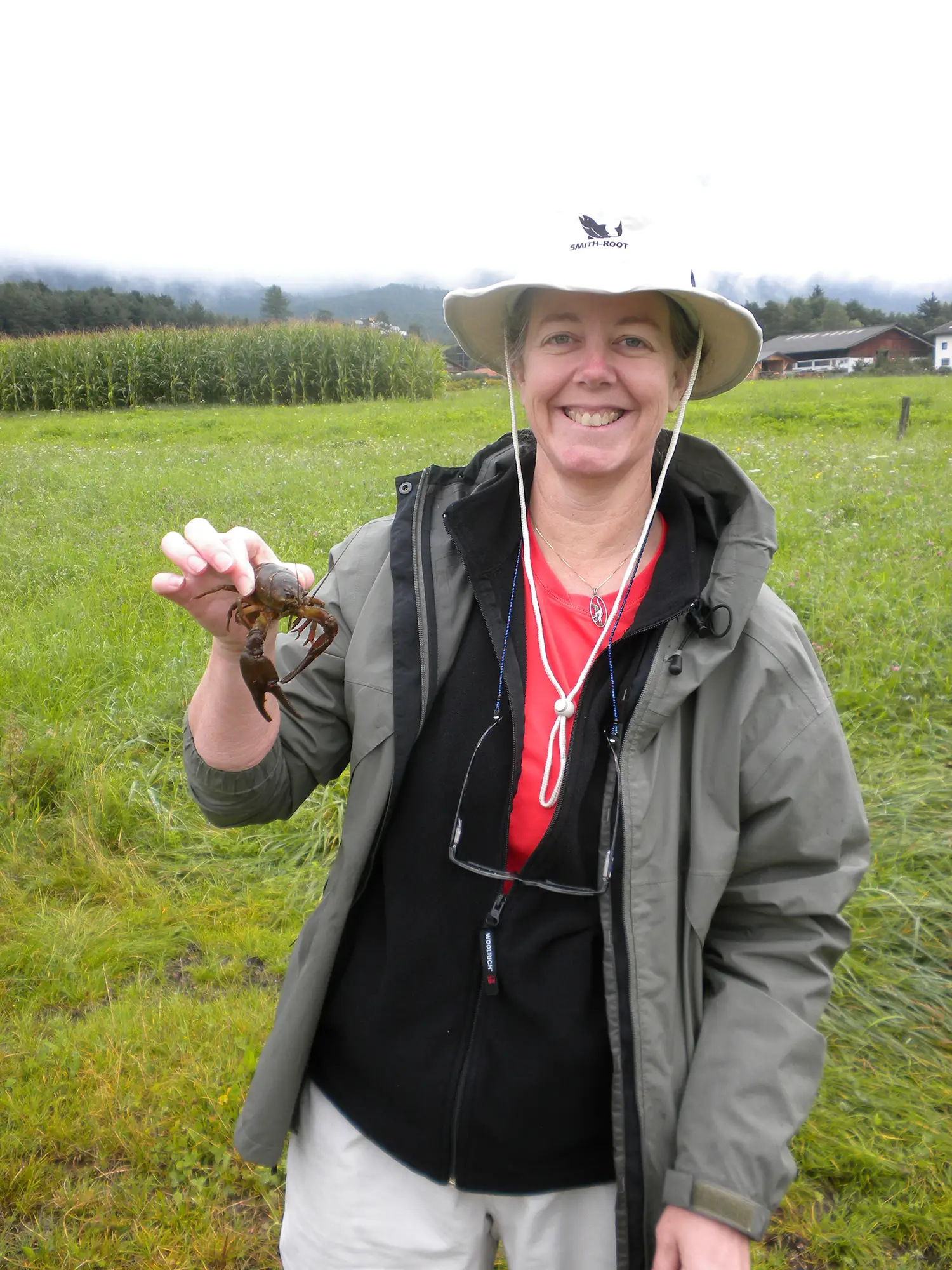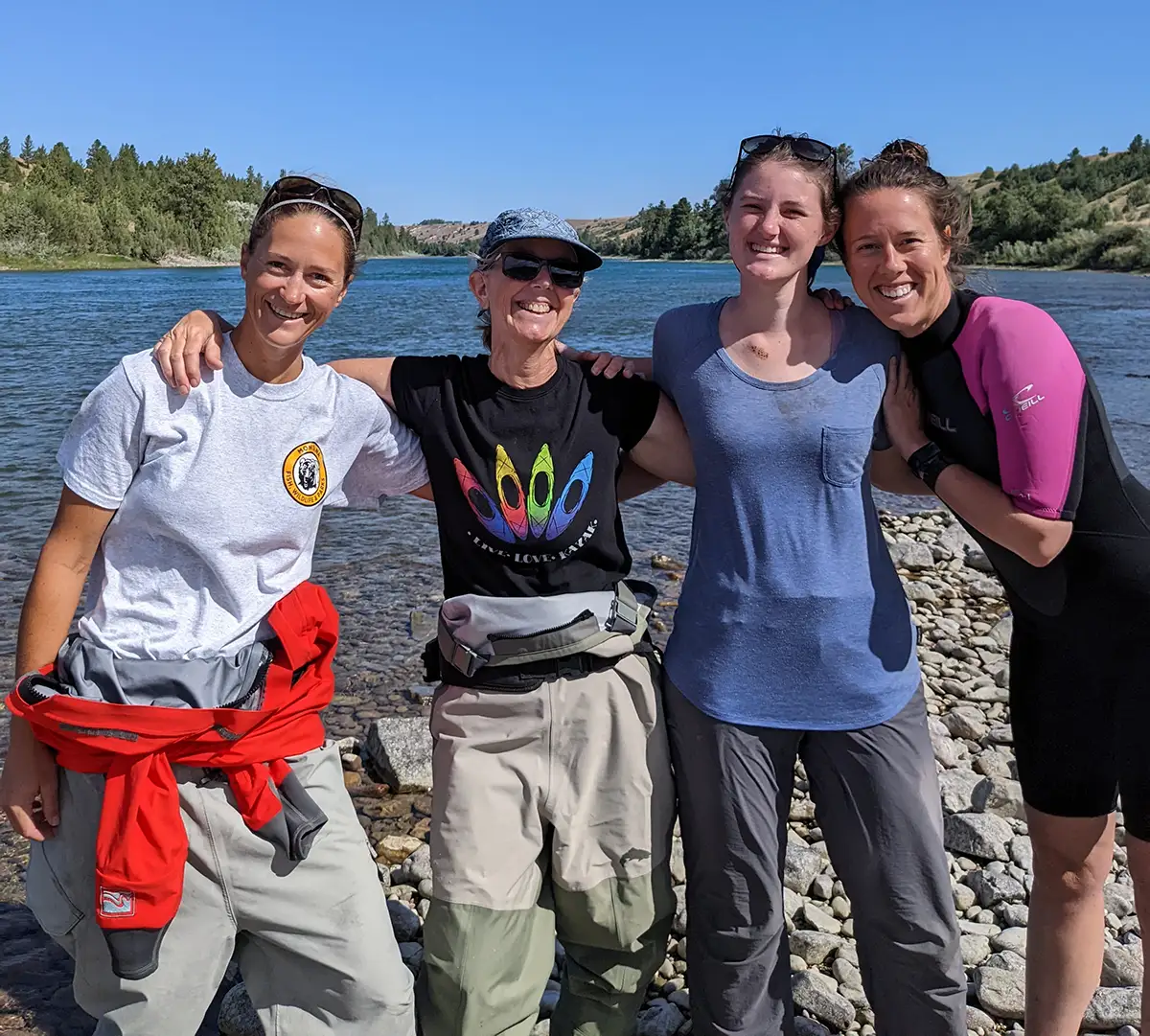United States Forest Service mentor studies native status of crayfish in Montana
Meet Susan “Susie” B. Adams

Adams holding a crayfish in Austria while on a field trip at an International Association of Astacology (study of crayfish) conference. (Photo credit: Susan B. Adams)
Susan “Susie” B. Adams, team leader for the United States Forest Service’s (USFS) Aquatic Conservation and Ecology Team, was almost five years old when she was introduced to signal crayfish at Lake Tahoe. After catching crayfish—also called crawdads or crawfish—in a bucket all day, Adams was astounded by how little food came out of all that work. She could never guess that, decades later, that same crayfish species would become a big part of her research as an Oak Ridge Institute for Science and Education (ORISE) USFS mentor.
Adams got a taste for the natural world as a child after her mother started a Ranger Rick Club. It was a no-brainer to go into science, technology, engineering and math (STEM), so Adams earned her bachelor’s degree in biology from Carleton College. She completed a handful of seasonal jobs before later graduating with her master’s in fisheries management from the University of Idaho and then her doctoral degree in organismal biology and ecology from the University of Montana.

Pictured: Lindsey Gilstrap, Susan “Susie” B. Adams, Norah Bruce, and Stacy Schmidt standing by the Flathead River in Lake County, Montana. (Photo credit: David Schmetterling, Montana Fish, Wildlife and Parks)
Wanting to get students and recent graduates involved in fisheries, as well as provide a space for her own continued learning, Adams became a USFS mentor at ORISE. The USFS Program is funded by the U.S. Department of Agriculture U.S. Forest Service Office and administered through the U.S. Department of Energy’s (DOE) Oak Ridge Institute for Science and Education (ORISE). ORISE is managed for DOE by ORAU.
Adams has collaborated with and mentored four mentees, three of which were part of a project to determine the native status of the same crayfish species she collected as a child, the signal crayfish. The southeastern United States is the “global epicenter of crayfish diversity,” notes Adams, with there being 100 pecies in Alabama alone. Crayfish profoundly influence their environments through their burrowing activities and by eating many types of food and, in turn, being eaten by over 300 kinds of animals in North America, making them a point of interest to researchers. In Montana the signal crayfish was believed to be native, but after doubts were raised, Adams and her mentees set out to determine if this was true, as it affects how the state regulates them.
“One of my summer interns, Hamp Kennedy, is a historian and high school history teacher,” says Adams. “He singlehandedly found the smoking gun for crayfish introduction into western Montana in the 1930s—I cannot overstate the importance of that find!”
For Adams, collaborating across multiple disciplines is one of the most rewarding aspects of being a mentor. While she imparts her knowledge on fisheries and ecology to her mentees they also provide their own knowledge to her in turn, making the results of their research that much richer. She recommends the ORISE program to those seeking to learn more and enrich their future STEM careers by building productive relationships.
“It’s a great way to learn new skills, see if the federal government seems like a place one would like to work, greatly expand one’s professional network and perhaps get a foot in the door for a permanent position,” says Adams. “As a mentor, it’s an easy way to bring in someone who can add a new dimension to your team, and it’s rewarding to help others along in their careers.”
Outside of her career and passion for mentorship, Adams loves to kayak, hike, camp, read, garden and “procrastinate on doing home maintenance.” Adams has also been working on an anthology of field stories from women in biology, which she excitedly looks forward to publishing.
The U.S. Forest Service Research Participation Program is funded by the U.S. Department of Agriculture U.S. Forest Service Office and administered through the U.S. Department of Energy’s (DOE) Oak Ridge Institute for Science and Education (ORISE). ORISE is managed for DOE by ORAU.

